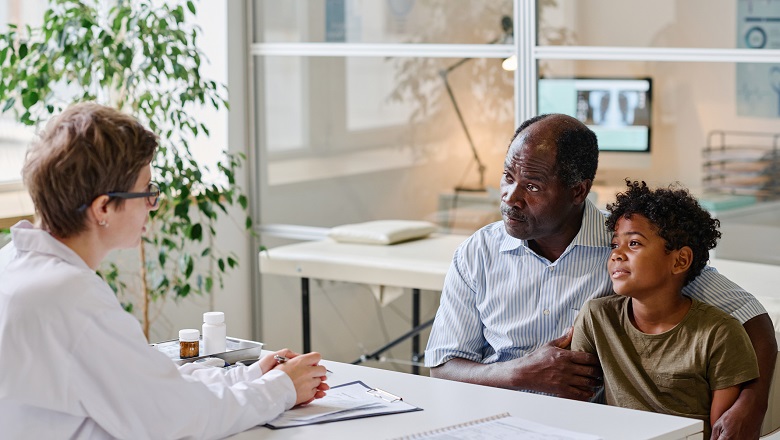
IoPPN researchers celebrate wins at the ACAMH Awards 2023

Researchers from the Institute of Psychiatry, Psychology & Neuroscience (IoPPN) won awards and commendations at the Association for Child and Adolescent Mental Health (ACAMH) Awards ceremony on 9 November 2023. To be nominated for an ACAMH Award is a prestigious recognition of those who are at the forefront of the advancement of child and adolescent mental health research, and practice.
Digital Innovation Award for Best Digital Intervention
Dr Johnny Downs was announced as winner of the Digital Innovation Award at the ACAMH Awards Ceremony. This award is presented to a clinician who has put evidence base into practice within the information technology and digital fields of child and adolescent mental health.
“I feel incredibly honoured to receive this award from ACAMH, although naming me as individual belies how much of the work is driven by the team I’m a part of. I am so grateful to my wonderful colleagues at the CAMHS Digital Lab, who are driven by a shared mission to enhance the access and engagement of evidence based mental health interventions for children, young people and their families, and crucially, support CAMHS practitioners and make their working lives better.
I do want to say a very special thanks to my colleagues: Dr Alice Wickersham, Craig Colling and Jess Penhallow who are wonderful to work with, and who mischievously submitted this nomination without my knowledge. And finally thank you to ACAMH, who through this award category highlights those who do important interdisciplinary CAMH research and practice using mental health digital interventions. I would urge everyone to look all the nominees for this category, and great work they are doing.”
Dr Johnny Downs is an NIHR Clinician Scientist at the Department of Child & Adolescent Psychiatry and Child and Adolescent lead, Centre for Translational Informatics. His research focuses on the use of digital information for epidemiological studies examining risks factors and outcomes for childhood neurodevelopmental and mental health disorders. Dr Downs is the founding lead of the CAMHS Digital Lab with the NIHR Maudsley Biomedical Research Centre and is a co-investigator at the NIHR Children and Families Policy Research Unit.
Research Trainee of the Year Award
The Research Trainee of the Year Award was presented to Dr Genevieve Morneau-Vaillancourt, from the school of Mental Health and Psychological Sciences at the IoPPN. This award is given to a trainee or student who is less than two years post PhD and who has shown initiative or made a significant contribution to child and adolescent mental health.
“I feel very honoured and privileged to receive The Research Trainee of the Year Award from ACAMH! I have the privilege of working with fantastic colleagues from the EDIT lab, TNG lab, and TEDS team at the SGDP Centre. I am lucky to be supported by great mentors, particularly Professor Thalia Eley, who inspires me and has taught me so much about research, making important decisions as an early career researcher, and managing work-life balance in academia. This award is a fabulous recognition of the work I have conducted along with my colleagues on the role of peer relationships in driving risk for mental health problems in children and adolescents and will support me in further examining these questions using different genetic approaches. Huge congratulations to the other nominees!“
Dr Genevieve Morneau-Vaillancourt is a Post Doctoral Research Fellow whose research interests include understanding why some children and adolescents suffer from persistent anxiety and depression and which factors exacerbate these internalising problems over time.
David Cottrell ‘Education of CAMH Professionals’ Award
Dr Mark Kennedy was highly commended in the category of Education of CAMH Professionals Award, an award which focuses on professionals having a significant impact upon the education or training of those working in child and adolescent mental health care.
“Firstly I’d like to say a big thank you to those who contributed to the course and to all the students on it. Also, I would like to say a huge congratulations to the winners and other nominees for their inspiring work.”
Dr Mark Kennedy is a Senior Teaching Fellow as part of the Child and Adolescent Psychiatry Department at the IoPPN in the School of Academic Psychiatry. He was also a researcher on the English and Romanian Adoptees (ERA) study at King’s College London. His work has focused on the developmental outcomes of extreme early adversity, including ADHD/neurodevelopmental disorders, attachment and mental health.
Further IoPPN researchers were shortlisted for awards: Ms Alice Stephens for Digital Innovation Award for Best Research on Digital Impact, Miss Emelia Pasternak-Albert for Clinical Trainee of the Year Award and the SPARK Research Team for Innovative Research, Training or Practice in Low and Middle Income Countries.
Categories
Follow Us
For the latest updates and news, follow us on our social channels.












Recent Comments